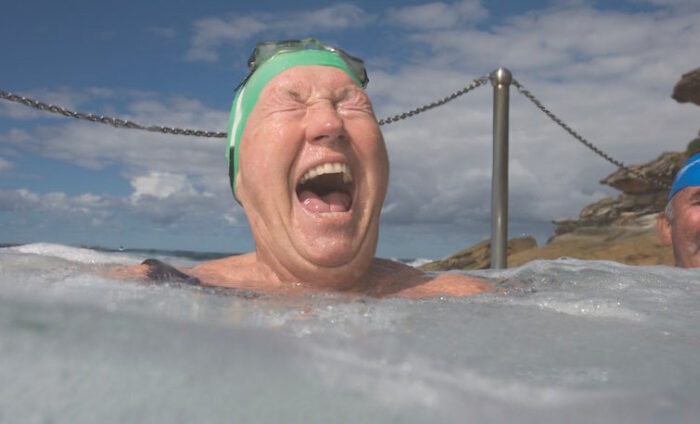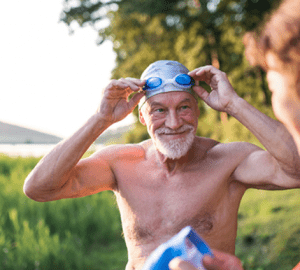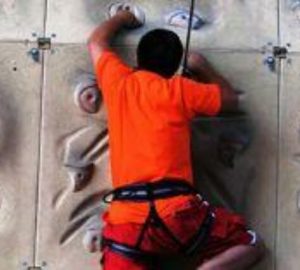
Sport pyschology – the feel good factor
Sport psychology is the study of how psychology influences sports, athletic performance, exercise and physical activity. This month we focus on the ‘feel good’ factor: the relationship between exercise and self-esteem.
We all know that regular
exercise is good for us.
It strengthens our bones
and muscles, keeps our
heart and lungs in good condition,
helps us to relax, can keep our weight
in check and can make us less likely to
get ill. However, exercise can do more
than just give us physical benefits, it
can also boost us psychologically.
Individuals who engage in exercise
often report ‘feeling good’ afterwards,
people can feel energised or just
generally feel happier. The belief that
exercise positively influences mood is
widespread and long standing, with
individuals often claiming that by
‘feeling good’, they often mean they
feel better about themselves after
physical activity. Feeling better about
yourself or self-esteem is often seen as
the single most important measure of
psychological wellbeing.
What is self-esteem?
Firstly, it is important to understand
what self-esteem really is. Self-esteem
can be referred to as the value we
place on aspects of ‘the self ’. It is
closely related to self-concept, which is our identity or a ‘description’ of ourselves. This ‘description’ could be all the information we have gathered
about ourselves in our lives based on our abilities, qualities, traits and roles in life. It is a part of our self that we are aware of and can describe. This self-concept becomes increasingly complex as we mature from infancy to adulthood. Our self-esteem is a self-rating of how well ‘the self ’ is doing.
As a mental construct self-esteem is abstract, not directly observable or measurable and exists only in the mind of each of us; we are the only people who know how we truly feel about ourselves!
Why is it important?
Self-esteem is paramount to our mental
and physical well-being. If people
feel good about themselves, they are
likely to be in better physical and
mental health. Our level of self-esteem
determines how we operate in life –
how we interact with others, such as
our spouses, children, friends and
strangers. Self-esteem can determine
our goals and what we strive for, our
achievements and our satisfaction and happiness in life. It therefore makes
sense that anything you can do to
boost your self-esteem is going to
benefit you.
What is the relationship between exercise and self-esteem?
There are two main approaches in sports
psychology to
looking at the
relationship
between exercise and self-esteem. Can you decide which approach you fit into?
One approach
says that self-esteem
can be a motivator
for physical activity.
Individuals who have higher
self-esteem and physical self-worth
are more likely to take part in physical
activity contexts as this is an area
where they are competent and their
self-worth can be maintained. We all enjoy feeling good about ourselves and
are therefore drawn to opportunities
and experiences that enable us to have
high self-ratings. Therefore if you have
higher self-esteem, it can motivate you
to engage in physical activity.
The other approach states that
self-esteem can be changed through
experience that is either positive or
negative, through development in
skills, mastery, success and so on. You
may recognise this approach from PE lessons at school. In this approach self-esteem is seen as an outcome of
physical activity (as opposed to self esteem facilitating engagement in physical activity).
In reality, these two approaches are not mutually exclusive as initial engagement in physical activity could be externally motivated, may lead to enhanced self-perceptions, which, in turn, may motivate subsequent activity.
What does the evidence say?
Reviews of literature in this area do
conclude that physical activity can
enhance physical self-worth and
self-esteem, however the strength of
the effect is less clear. The belief that
exercise just improves self-esteem is
considered too simplistic, it may be
that although exercise can enhance
self-esteem, it may be that this is due to
changes in physical self-perceptions.
What about you?
One of the most
important aspects of sport psychology
is becoming self-aware and learning about yourself. Contemplating your ownself-esteem in relation to your swimming, or any exercise that you participate in, is one that you may or may not have considered before. Try answering some of the following questions to get you thinking.
Consider the last time you engaged
in physical activity:
- How did you feel immediately after
the exercise?
- How did you feel several minutes
later?
How do you feel days later?
- Do you notice a difference in your
mood related to exercise/physical
activity?
- How do you feel if you don’t
exercise?
- Do you feel differently after a high
intensity bout of exercise or a gentler
bout of exercise?
Knowing how you feel about exercise,
and having an awareness of the benefits
it can give you, is the first step to
working on building your self-esteem.
How can I build my self-esteem and protect it?
Your self-esteem can influence your
happiness or success. It can, however, be
swayed by everything from the people
in your lives to your own inner voice.
Here are some tips to help you build up
your own self-esteem through exercise.
- Try identifying and challenging any negative self-beliefs about yourself. It can be helpful to practise talking to yourself in the same way you would talk to others.
- Connect with people who care –
this can be family members, but
also people you swim with, friends
or members of your club. Listen to
what they say about you, take it on
board, it can help you to feel good
about yourself.
- If you like swimming and enjoy it, then do more of it! Try and focus on
the process of what you are doing,
rather than the outcome.
- Focus on the positives – celebrate your successes! No matter how
small they may seem to you, take
time to praise yourself.
- Keep practising and working on all
of the above, try and see boosting
your self-esteem as a habit you can
work on daily.
Helen Davis
is a sport
psychology
consultant who
works with
individuals,
teams and
coaches on
all aspects
of sporting
performance.
Helen has a
BA (Hons) in
Psychology, an
MSc in Sport
and Exercise
Psychology
and is currently
working towards
chartered status
with the British
Psychological
Society. She is
also an active
masters and
open water
swimmer.
Find out more: thinkbelieveperform.co.uk. Follow Helen on Twitter @helenDav22453
Next month: How are you
viewing your next performance? As a
challenge or as a threat?








